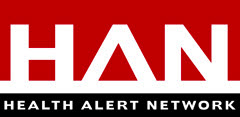
Wednesday, May 27, 2009, 11:30 EDT (11:30 AM EDT)
CDCHAN-00293-2009-05-27-UPD-N
CDC Guidance on
Antiviral Treatment of Patients with Confirmed, Probable, or Suspected Cases of
Novel Influenza A (H1N1)
Summary: As a reminder to clinicians, this Health Update
summarizes existing CDC guidance issued on May 6, 2009 on the use of antiviral
drugs in novel H1N1 patients and their close contacts. CDC recommends that
influenza antiviral treatment be given to all hospitalized patients with
confirmed, probable, or suspected novel influenza A (H1N1) and any patient with
confirmed, probable or suspected novel influenza A (H1N1) who is at higher risk
for seasonal influenza complications. All hospitalized patients should be
carefully monitored and treated with antiviral medications as soon as possible
after admission, including patients who seek treatment more than 48 hours after
onset of symptoms. The drugs recommended for treatment are either oseltamivir or zanamivir. The
novel H1N1 viruses are resistant to amantadine and rimantadine.
Background:
Clinical studies indicate that antiviral treatment is
safe and effective for seasonal influenza, and that treatment is most effective
if started as early as possible, preferably within 48 hours of illness onset.
Antiviral susceptibility testing of novel H1N1 viruses indicates that antiviral
drugs should be effective for treatment of this new strain of influenza
also.
A recent study published in the Morbidity and Mortality
Weekly Report (MMWR) described
diagnosis, medical conditions, and treatment of 30 patients hospitalized in
Recommendations:
CDC recommends that antiviral treatment for novel
influenza A (H1N1) be given as soon as possible after onset of symptoms for all
hospitalized patients with confirmed, probable, or suspected novel influenza A
(H1N1) virus infection. All hospitalized patients with novel influenza A (H1N1)
infection should be monitored carefully and treated with antiviral therapy,
including patients who seek care more than 48 hours after illness onset.
Influenza antiviral medicines should be initiated as soon as possible if
influenza is suspected, and often before diagnostic test results (RT-PCR) are
available, for maximum benefit. If bacterial co-infection is suspected, antibacterials should be directed at likely pathogens
(e.g., S. pneumoniae,
S. aureus) consistent with existing guidelines
for the management of community-acquired pneumonia.* Antibacterial therapy also
should be initiated after appropriate diagnostic specimens are obtained,
including blood, respiratory secretions (especially for intubated
patients), and pleural fluid for culture and urine for pneumococcal antigen
testing (in adults).
Patients who are at higher risk for
seasonal influenza complications (including people 65 years
and older, children younger than five years old, pregnant women, and people of
any age with chronic medical conditions) are also recommended for treatment,
regardless of whether they require hospitalization.
For More Information:
Antiviral Treatment for Novel Influenza A (H1N1)
Virus Infection http://www.cdc.gov/h1n1flu/recommendations.htm
MMWR: Hospitalized Patients with Novel Influenza A (H1N1) Virus Infection ---
May 18, 2009 / 58(Early Release);1-5 California, April--May, 2009 http://www.cdc.gov/mmwr/preview/mmwrhtml/mm58e0518a1.htm
Additional documents for health care providers,
public health officials, and the public are available on www.cdc.gov.
Information for the public is posted daily in both English and Spanish. Also,
CDC's toll-free hotline, 800-CDC-INFO (800-232-4636) TTY: (888)
232-6348, is available 24 hours a day, every day.
*Mandell LA, Wunderink RG, Anzueto A, et al.
Infectious Diseases Society of America / American Thoracic Society Consensus
Guidelines on the Management of Community-acquired Pneumonia in Adults. Clin Infect Dis 2007;44 Suppl 2:S27-72.
HAN Message Types
- Health Alert: Conveys the highest level of importance; warrants immediate action or attention. Example: HAN00001
- Health Advisory: Provides important information for a specific incident or situation; may not require immediate action. Example: HAN00316
- Health Update: Provides updated information regarding an incident or situation; unlikely to require immediate action. Example: HAN00309
- Info Service: Provides general information that is not necessarily considered to be of an emergent nature. Example: HAN00319
## This Message was distributed to State and Local Health Officers, Public Information Officers, Epidemiologists and HAN Coordinators as well as Clinician organizations ##
You have received this message based upon the information contained within our emergency notification database. If you have a different or additional e-mail or fax address that you would like us to use, please contact your State-based Health Alert Network program at your State or local health department.
- Content source: CDC Emergency Risk Communication Branch (ERCB), Division of Emergency Operations (DEO), Office of Public Health Preparedness and Response (OPHPR)
Get email updates
To receive email updates about this page, enter your email address:
Contact Us:
- Centers for Disease Control and Prevention
1600 Clifton Rd
Atlanta, GA 30333 - 800-CDC-INFO
(800-232-4636)
TTY: (888) 232-6348 - Contact CDC-INFO


